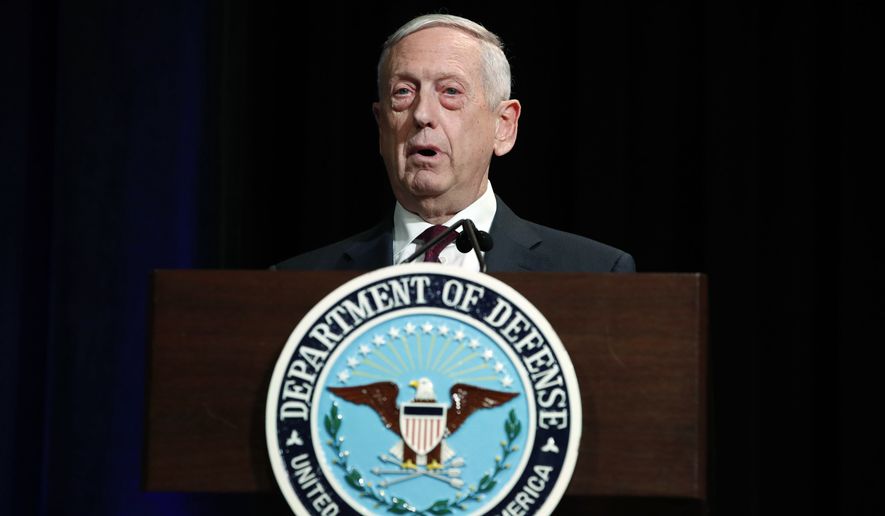BRUSSELS — The Pentagon is determined to keep tensions over trade and other issues between the U.S. and its allies from jeopardizing President Trump’s long-term campaign to get America’s NATO allies to contribute their fair share to the alliance’s defense coffers, Defense Secretary James N. Mattis said Wednesday as he arrived here for a summit of NATO defense ministers.
Mr. Mattis stopped short of characterizing the White House’s decision to impose higher tariffs on steel and aluminum imports from European allies as a trade war, noting the current economic standoff between Washington and Brussels is part of the “give and take” between allies jockeying for position in international markets.
“What we are looking for is fair and reciprocal trade, [and] going along the path to there, it is going to be a little rocky at time. But so far I do not anticipate any [impact] on national security,” in the near term, Mr. Mattis added.
Asked if he feared the transatlantic tensions over trade could undercut alliance cohesion, Mr. Mattis replied, “Right now I don’t see that. And I think it’s still premature to call it a trade war.”
NATO Secretary-General Jens Stoltenberg said he too was striving to keep tensions on other policy issues from infecting the defense bloc’s cohesion.
“There are now serious disagreements with NATO allies on serious issues,” Mr. Stoltenberg. ” … What we have seen again and again is that we have been able to unite around NATO’s core task, to protect and defend each other despite those differences.”
The U.S. Ambassador to NATO Kay Bailey Hutchison, in an interview with Fox News, sounded a similar note of preserving alliance cohesion at a time of political strains.
“In a group of 29 countries, there are a lot of disagreements on a bilateral basis,” she said. “There are disagreements within NATO on how we do things. But there’s no disagreement on our goal, our common goal of a security umbrella for all 29 of us.”
Widening divisions over economic and political issues could affect the progress NATO allies have made toward meeting Mr. Trump’s demand of a minimum of 2 percent investment of GDP to defense. Mr. Mattis said the pressure campaign has already produced real results.
“In 2014, there were three countries that were spending 2 percent or more. … In 2018, we will have eight nations, so basically we will have doubled or nearly tripled that number of nations,” Mr. Mattis said.
The year 2017 “saw the largest growth in the percent of GDP [investment] in the last 25 years,” Mr. Mattis said, noting that increase “is really an indicator of NATO’s unified approach” to regional defense.
“When you see the increased defense spending by everyone … when you see what NATO is doing in Afghanistan with increased support, you see the output of these meetings,” Mr. Mattis said. “It is the output that I focus on.”
The U.S. defense chief also will be talking to his NATO counterparts about bolstering defenses in ways calculated to deter aggression by Russia, The Associated Press reported. The defense chiefs are likely to endorse plans to establish two new NATO military commands as part of a push to counter Russian buildups.
They also are expected to approve a plan to increase, by 2020, the number of allied air, ground and naval units that could be ready for combat within 30 days of being put on alert.
Mr. Mattis said seeking a better working relationship with the Kremlin remains a priority, but Moscow has not always been cooperative.
“Try as we might, trying to make common cause with Russia has been exceedingly difficult,” he said. He cited Russian interference in the American, as well as some European, elections, and its alleged violation of the 1987 Intermediate-Range Nuclear Forces Treaty, as well as its 2014 annexation of Crimea and incursions into eastern Ukraine.
— Staff writer Ben Wolfgang in Washington contributed to this report, which was based in part on wire service reports.
• Carlo Muñoz can be reached at cmunoz@washingtontimes.com.




Please read our comment policy before commenting.